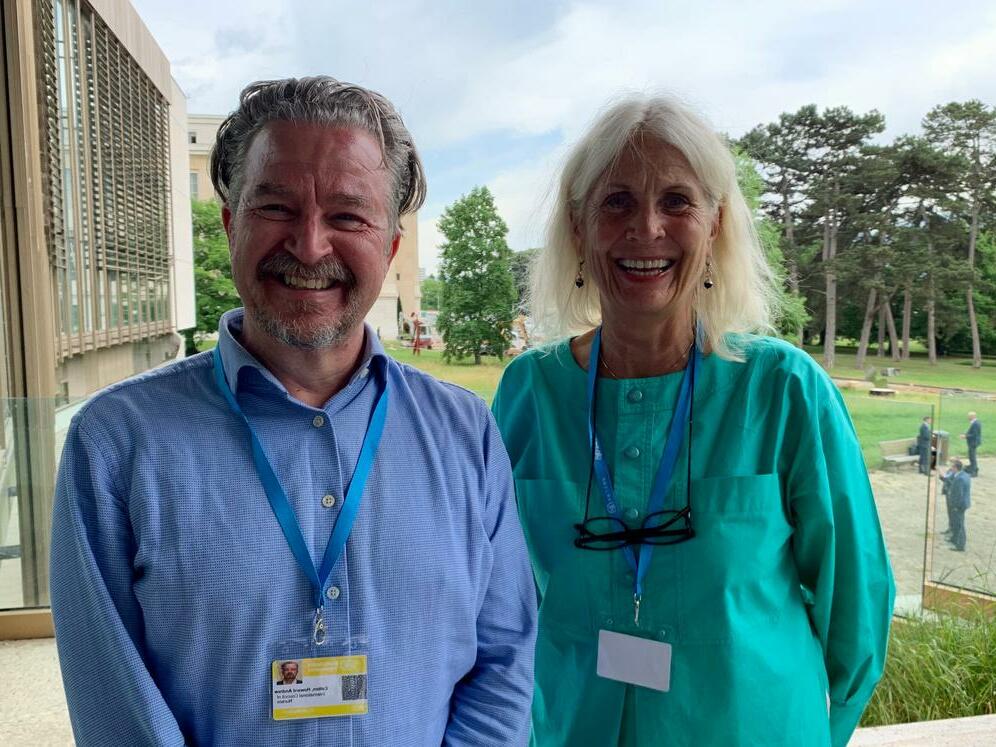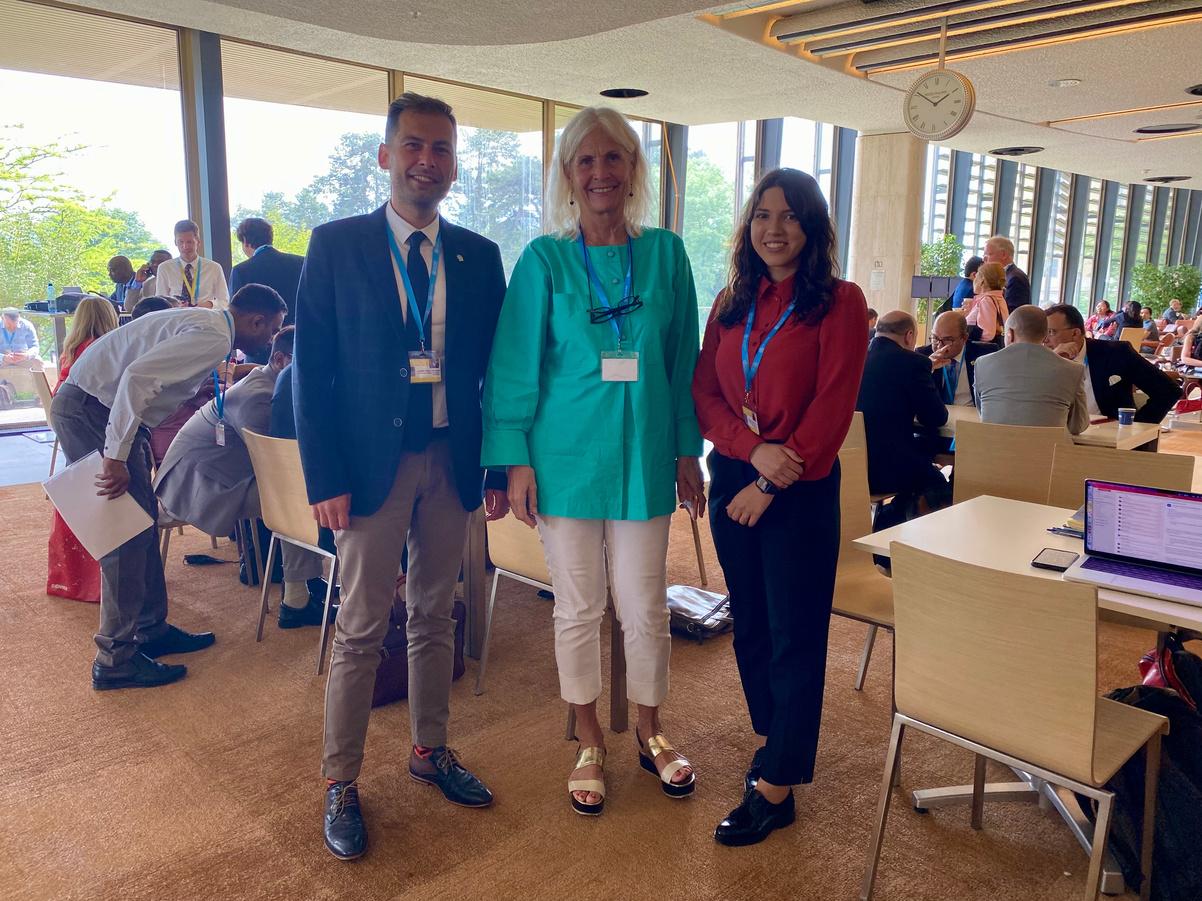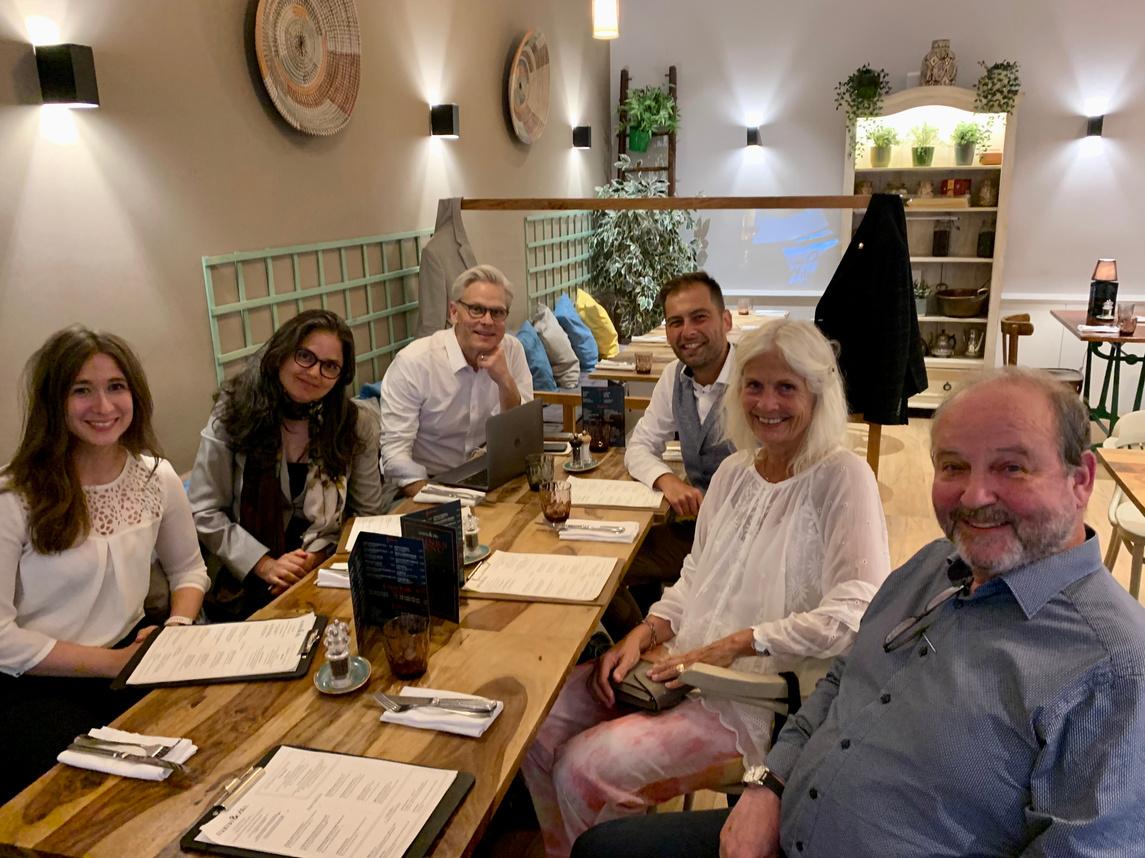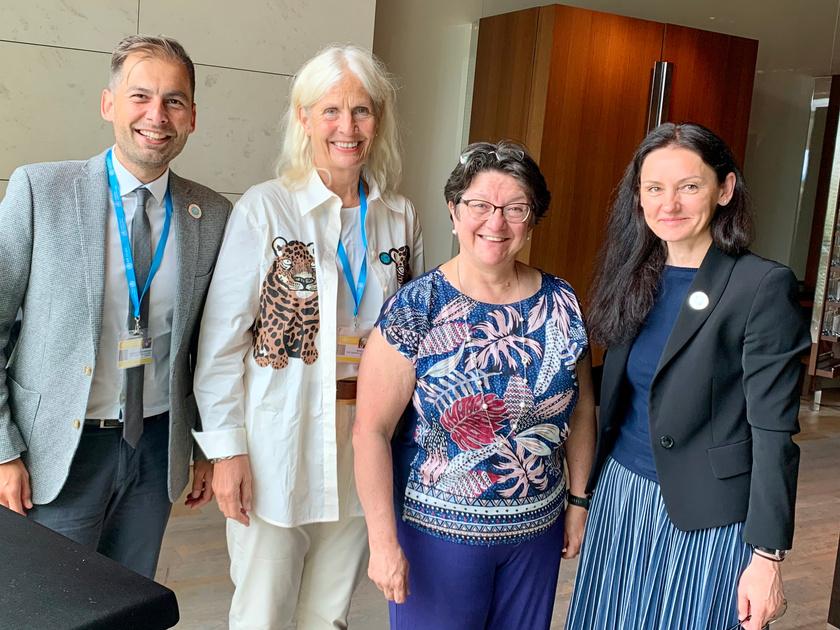
7 minute read
WONCA AT THE WORLD HEALTH ASSEMBLY
from WONCA News June 2022
by WONCA
W O N C A & W H O N E
W WONCA AT THE
Advertisement
S
75TH WORLD HEALTH ASSEMBLY
WONCA & WHO NEWS
The Seventy-fifth World Health Assembly, held in Geneva, Switzerland, on 22-28 May 2022, was the first in-person Health Assembly since the start of theCOVID-19pandemic. The theme of this year’s Health Assembly is: Healthforpeace,peaceforhealth. The COVID-19 pandemic and other health emergencies with international reach have highlighted the leadership and coordinating role of WHO in responding to such events. Strengthening preparedness for and response to health emergencies are a key theme of the Health Assembly. Eventsbeganwithahigh-levelsegmenton22May with speeches from the elected Health Assembly President, Heads of State, special guests, an address by the WHO Director-General and the presentation of the Director-General’s Health Awards. On the occasion WONCA collaborated with other organizations in multiple constituency statement, includingoneonHumanResourcesforHealthand two of them on Strengthening WHO Preparedness forandResponsetoHealthEmergencies.
CONSTITUENCY STATEMENT ON GLOBAL STRATEGY ON HUMAN RESOURCES FOR HEALTH: WORKFORCE 2030
75th World Health Assembly (Agenda item 15) 23 May 2022 TheCOVID-19pandemichasreinforcedthecritical importance of health workers to strengthen health systems and global health security. It has highlighted women’s central role in delivering health services, since women are 70% health workers,and90%offrontlinehealthworkers. Community Health Workers and Primary Care providers have played an irreplaceable role during the pandemic and in continuing essential health services. However, after over two years of unprecedented stress, health workers are experiencing burnout and leaving their professions, deepening the existing global health worker shortage. Additionally, many women health workers are marginalized in decision making, underpaid, often unprotected and harassed. Thereforewecallonmemberstatesto: Create an enabling environment where women in all their intersecting identities can harness their expertise and play an equal role inhealthdecision-makingandleadership; Ensure safe, decent and equal work for Women health workers including those providing critical SRH services, through a new social contract , which is fair for women and strengthenshealthsystems. Address the burnout and shortage of health workers, which risks the low quality of care forclientsincludingformothersandbabies.
W O N C A & W H O N E W S
Implement large scale gender-responsive training of the health workforce to meet futureneedsandachieveUHC,includingwith. pandemic prevention, preparedness and responsefinancingmechanisms. Strengthen Primary Health Care through recruitment and training, including on sexual and reproductive health, and addressing retention. Ensure PHC reaches the most marginalized by incentivizing Health workers toworkinremoteandruralareas;
WONCA & WHO NEWS
Collect and use data on unpaid and underpaid healthcare work, including in the informalhealthcaresector,
Support the critical role of WHO, and provide sufficient funding to the Multi-Partner Trust Fund.
READ AS A PDF
75th World Health Assembly (Agenda Items 16.2) 24 May 2022 Because the actors involved in any response to a future pandemic are varied, for such an instrument to be effective, it must result from strong multilateralism, with equal respect and participation afforded to all partners involved, including non-state organizations committed to thepublicinterest. It must embrace the wide range of individuals, communities, governments, and the private sector necessary to prevent epidemics and strengthen social protection and health systems, including the protection of the workforce’s health – a workforce that extends beyond the health professions, such as doctors, nurses, and social workers, and includes service workers, such as bus drivers, janitors, and supermarket clerks. It must also include environmental health officers, whoareincreasinglynecessaryinanailingworld For any Pandemic Treaty to be effective, it must likewisecentrecommunityengagement,educate and involve community members, employ effective communication strategies throughout, and thereby foster trust — without public confidence in the process and its policies, any instrumentisdoomedtofail. Moreover, the Treaty must ensure an equitable distribution of resources, from financial assistance to vaccine access, knowledge sharing and technology transfer. It must safeguard the healthofthemarginalized. Further, it must acknowledge that any instrument needs to integrate palliative care into primary health care, including the training of healthcare workers and the availability of related medicines to all – regardless of economic status – and thereby ensure that those already affected by other diseases, and those who cannot be saved, areguaranteedadignifieddeath. It must ensure that preparedness and response interventions are environmentally sustainable andinlinewithclimatecommitments.
W O N C A & W H O N E W S
Lastly, for the instrument to be meaningful, it requires accountability and transparency mechanisms. Non-State Actors supporting this statement: WFPHA • IHF • WONCA •The Task Force for Global Health • Global Health Council • ISQa • IPPNW • IAHPC•GNP+•WorldPatientsAlliance
READ AS A PDF
WONCA & WHO NEWS
75th World Health Assembly (Agenda Items 16.2) 24 May 2022 This constituency statement is delivered by the World Heart Federation on behalf of the Framework Convention Alliance for Tobacco Control, International Alliance of Patients’ Organizations, International Diabetes Federation, International Pharmaceutical Students Federation, International Society of Nephrology, World Hypertension League, and World Obesity Federation. It is also supported by the World Organization of Family Doctors and World Stroke Organization. People living with circulatory conditions are disproportionately impacted by the COVID-19 pandemic. The lack of attention to NCDs in the early stages of the pandemic impeded their inclusion in strategic response plans and few countries included NCDs as part of essential health services packages. This has resulted in a deadly interplay between the NCD epidemic and theCOVID-19pandemic. NCDs including hypertension, kidney disease, diabetes, stroke, obesity, and other circulatory conditionsmustbeatoppriorityinpreparedness, response, readiness and coordination activities and agreements at global, regional and country levels. As such, our organisations, representing the global circulatory health community (those most impactedbyCOVID-19),callonMemberStatesto
Prioritize ongoing prevention, screening, and treatment for circulatory conditions in national pandemic response and recovery plansthroughpatientco-creation;
Increasedomesticallocationofresourcesand develop targeted policies to tackle CVD and
NCD risk factors, including those focusing on digital health technologies, through mechanisms such as taxation of unhealthy commodities
Integrate monitoring and data collection on
NCD prevalence, comorbidities, and risk factors into measures of pandemic readiness, resilience,andresponse;
Strengthen Primary Health Care and invest in family medicine to ensure equitable access to essential health services, particularly for people living with NCDs and in low-resource settings;and
StrengthentheNCDcomponentofemergency preparedness and response by formalizing these actions in a WHO convention, agreement or international instrument on pandemicpreparedness.
W O N C A & W H O N E W S
These steps would go far in making health systems more resilient and are expanded upon in our position paper. We look forward to working with you to prevent, and where necessary, respondtofuturehealthemergencies.
WONCA MEETINGS
During the World Health Assembly, WONCA President, Dr Anna Stavdal and WONCA CEO, Dr Harris Lygidakis held important meetings including:
Bettina Borisch, CEO of the World Federation ofPublicHealthAssociations(WFPHA) Bente Mikkelsen, Head of the Secretariat for the WHO Global Coordination Mechanism on thePreventionandControlofNCDs Mãdãlina Elena Mandache, Liaison Officer for MedicalEducationIssuesatIFMSA Howard Catton, CEO of International Council ofNurses(ICN) Jim Campbell, Director, Health Workforce, WHO Teri Reynolds, Unit Head at Integrated Health Services/ClinicalServicesandSystems,WHO John Fogarty, Clinical Services and Systems, Integrated Health Services, Division of UHC andLifeCourse Shannon Barkley, Technical Officer for PrimaryHealthCare DenisPorignon,PolicyAdvisor,WHO. Ron Lavater, CEO at International Hospital Federation(IHF) PaulLaffin,AdvocacyDirectoratInternational SocietyofNephrology(ICN) Susan Brown, Director, Policy & Advocacy, WomeninGlobalHealth Helga Fogstad, Executive Director at Partnership for Maternal, Newborn and Child Health(PMNCH)
“There is no Primary Health Care and Universal Health Care without engaging family doctors!”
WONCA President, Dr Anna Stavdal and Dr Bente Mikkelsen,Director,Non-CommunicableDiseases in the division of UHC/Communicable and Noncommunicable diseases at the WHO HeadquartersinGeneva,Switzerland.
WONCA & WHO NEWS
READ AS A PDF
W O N C A & W H O N E W S

WONCA & WHO NEWS
“Stronger primary care means stronger multidisciplinary team. ” WONCA President, Dr Anna Stavdal at a meeting with the International Council of Nurses (ICN) CEO, Howard Catton.

WONCA President, Dr Anna Stavdal and WONCACEO,DrHarrisLygidakiswithTeri Reynolds, Unit Head at Integrated Health Services/Clinical Services and Systems, WHO; John Fogarty, Clinical Services a Systems, Integrated Health Services, DivisionofUHCandLifeCourse;Shannon Barkley, Technical Officer for Primary Health Care; and Denis Porignon, Policy Advisor,WHO.

“Family medicine by choice, not by chance!” A successful meeting between Mãdãlina Elena Mandache from IFMSA, WONCA President, Dr Anna Stavdal and WONCA CEO, Dr Harris Lygidakis at the 75th World HealthAssembly.
W O N C A & W H O N E W S
WONCA & WHO NEWS
“In the face of global gender imbalance in leadership, we are committed to advocate for gender parity in representation” WONCA President, Dr Anna Stavdal meeting Women in Global Health Director of Global Policy & Advocacy, Susan Brown and Merette Khalil from Women in Global Health Egypt.

“Maternal, child and adolescent health is first of all a primary care issue and family doctors are ready to team up with other health careworkers”
Meeting with Helga Fogstad , Executive Director of Partnership for Maternal, Newborn & Child Health.


